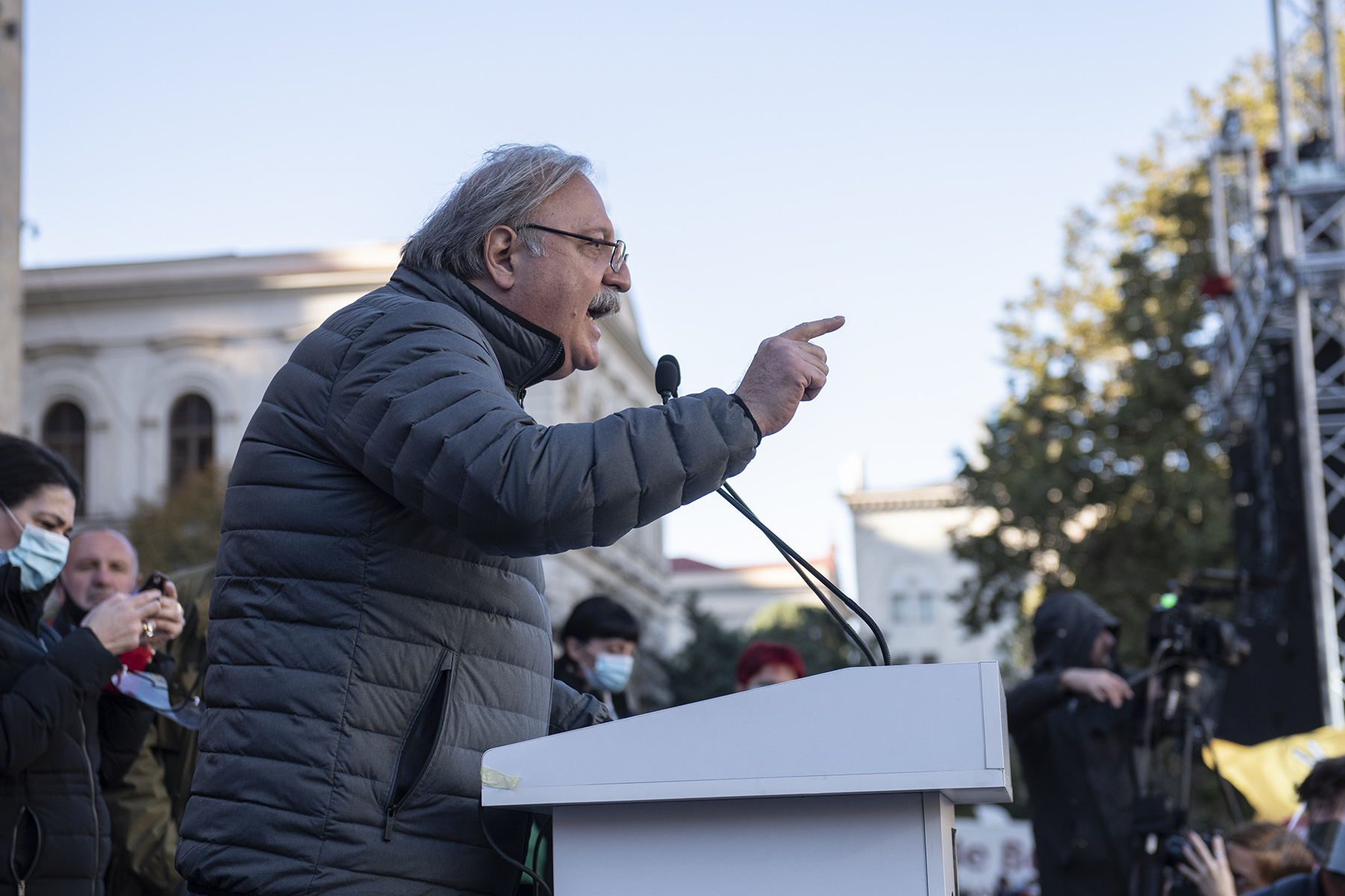UNM leader sidelined after suggesting ‘dialogue’ with Georgian Dream

Grigol Vashadze, the chair of the largest opposition group, the United National Movement (UNM), has rattled his party and their allies by advocating for post-election ‘dialogue’ with the government.
On 12 November, opposition groups gathered to agree their next move to push the government to hold new elections after what they have said was a ‘rigged’ parliamentary vote on 31 October.
Gigi Ugulava, one of the leaders of the European Georgia party announced after the meeting that they intended to go forward with their plan to pursue street demonstrations, rejecting UNM Chair Grigol Vashadze’s recent proposals.
The leaders of the eight opposition groups that passed the 1% threshold to enter parliament have otherwise remained tight-lipped on the meeting with Georgian Dream leaders at the residence of US Ambassador Kelly Degnan.
Opposition groups plan to meet US Secretary of State Mike Pompeo’s 17–18 November visit to Georgia with ‘silent’ street performances targeting the Georgian Government.
Grigol Vashadze, reportedly representing the UNM and their Strength in Unity bloc at today’s meeting brokered by US and European diplomats in Tbilisi, has also caused waves among opposition groups for advocating for opposition MPs to enter parliament, despite calls for a boycott.
After the 31 October vote, major opposition groups, as well as smaller parties, denounced the election, which gave the party in power over 48% of votes.
‘No end to that goddamn tunnel!’
Grigol Vashadze’s comments caught opposition groups by surprise after they, together with Vashadze’s UNM, organised a series of street demonstrations targeting the offices of the electoral administration as well as a protest outside Parliament in Tbilisi.

‘Protests should continue, the bigger the better, within the framework of Georgia’s Constitution. But simultaneously, we should sit and talk and try — if it is possible — to reach a compromise between two radically different positions’, Vashadze said in an interview with Rustavi 2 days after the demonstration outside Parliament.
Talking with Rustavi 2 on 11 November, he cited an unspecified ‘failed dialogue’ between the government and the opposition which he said was to be mediated by Western diplomats in Tbilisi as the ‘last trigger’ for him to speak publicly.
Vashadze lamented in his TV interview that ‘another’ post-election crises was sending voters to ‘despair’.
He insisted on Georgians finding better ways than ‘running to diplomats of the main strategic ally countries… asking them to help us talk to each other’ as if Georgians were ‘savages, unable to talk’ to each other.
Foreign diplomatic missions in Georgia were instrumental in striking a deal earlier this year that largely ended a dispute over electoral reforms on 8 March.
Backlash from the opposition
Both European Georgia and Girchi parties described Vashadze’s statement on 10 November as ‘confusing’, with Girchi’s Chair Zurab Girchi Japaraidze going as far as launching a ‘condemn Grigol’ hashtag on Facebook.
On 10 November, Nika Melia, an emerging leader within the UNM, called Vashadze’s comments ‘very unfortunate’.
‘Apparently, not every one of us understood the challenge in the country’, Melia told journalists that day.
Strategy Aghmashenebeli, European Georgia, and other opposition groups among over 15 parties coalescing within the informal opposition platform, have questioned Vashadze’s claim there was any negotiation planned between the government and the opposition.
Salome Samadashvili was the only high profile UNM member to side with the UNM chair.
‘Against the background of astonishingly intellectually poor political discourse around us, Grigol Vashadze’s interview today was like a breath of fresh air’, the outgoing MP wrote on Facebook on 11 November.
Previous election boycotts
Grigol Vashadze, who served as Foreign Minister in 2008-2012, took over the chairmanship of his party in March 2019, only 26 months after joining the party.
He took over from former President Mikheil Saakashvili, whose sentencing in absentia by Georgian courts on counts of abuse of power barred the UNM from formally keeping him as their leader.
It was Saakashvili, however, that the UNM nominated for the prime-ministerial post before the elections.
On 8 November, two days before UNM’s chair voiced his diverging views, the opposition groups gave a ‘deadline’ to the government to sack the head of the Central Election Commission (CEC), Tamar Zhvania, over her handling of the election.
Previous demands for repeated elections by the UNM and other opposition groups did not substantially alter Georgian Dream’s rule in recent years.
The UNM-led opposition coalition gave a similar ‘deadline’ to the government in early December 2018, after presidential candidate Grigol Vashadze refused to concede to Salome Zurabishvili
The opposition groups were unsuccessful in disrupting Zurabishvili’s inauguration on 16 November.
Similarly, the UNM’s boycott of the second round in 2017 after Vashadze denied Georgian Dream’s Giorgi Chighvaria a swift victory for the mayoral post in Kutaisi did not cause serious problems for the ultimate winner.
Critics of the opposition strategy, including former UNM cabinet member and political scientist Ghia Nodia and Tinatin Khidasheli, ex-defence minister under Georgian Dream and a frequent government critic, had already questioned the opposition’s plans to boycott the new parliament and second rounds.
Vashadze’s statements over the last two days were the first to suggest strong disagreement inside the UNM.







